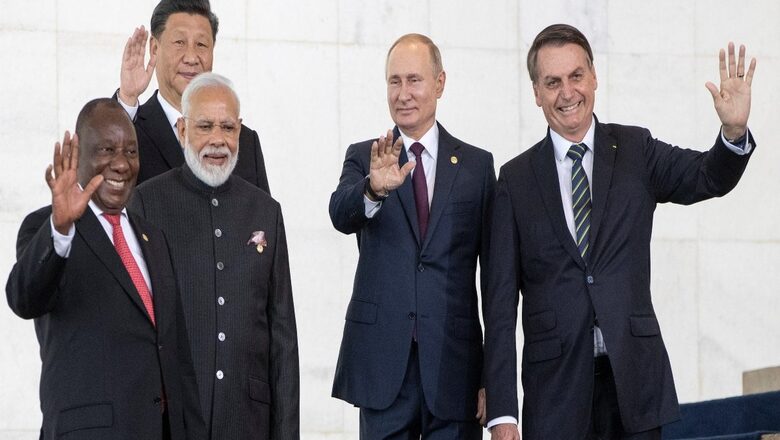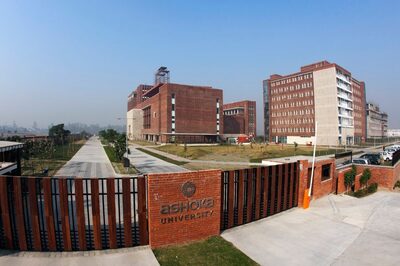
views
The 15th BRICS summit in Johannesburg from August 22 to 24 is being held in the background of many international developments: The conflict in Ukraine, its impact on the Global South, the collapse of ties between the West and Russia, Western sanctions on Russia that have disrupted ties of third countries with it, the sharp deterioration of US ties with China, the global trading system under stress with the weakening of the WTO and de-globalisation trends that include exploring more reliable and trustworthy supply chains, and so on.
The Summit will have major issues on its agenda, including expansion of membership, the criteria for doing so, increasing cooperation within the Global South and reshaping the global political and economic architecture to benefit developing countries, trading in national currencies amongst BRICS countries as a move towards de-dollarisation of trade exchanges, the potential for creating a BRICS reserve currency, reform of the global governance institutions, promoting a more multipolar world, attainment of the 2030 Agenda on Sustainable Development, and so on.
South Africa has made the Johannesburg summit a monumental affair by inviting 67 leaders from Africa, Latin America, Asia, and the Caribbean. This is far beyond what other BRICS countries have done under their Presidencies by way of special invitees. It is a good occasion for President Ramaphosa to increase his internal and external political profile at a time when South Africa’s economic situation post Covid has deteriorated sharply with a decline in GDP per capita, unemployment at around 35 per cent, and youth unemployment at more than 50 per cent, crippling power cuts, and volatile commodity prices.
South Africa is clearly seeking a leadership role in the Global South, which is also reflected in its President leading an African delegation on a peace mission to Ukraine and Russia in June to explore steps to end the ongoing conflict. President Ramaphosa also attended the Russia-Africa summit in St Petersburg in July 2023, where he raised his concerns about the negative effect of the Ukraine conflict on Africa, especially on food security.
In the context of moves to expand the membership of BRICS and what that might mean in terms of altering geopolitical balances in the international system by drawing countries into a grouping dominated by China and Russia, when both these countries are now being treated as adversaries of the West, the deliberations and the outcomes of the Johannesburg summit will be watched closely in the US and Europe. In any case, inviting such a large number of countries to the summit increases the political resonance of BRICS internationally.
According to the South African government, 22 countries have already formally applied for BRICS membership. This includes Saudi Arabia, UAE, Algeria, Egypt, Bahrain, Indonesia, Argentina, Iran, Turkey, Mexico, Nigeria, Cuba, the Democratic Republic of Congo, Gabon, Kazakhstan, etc. An equal number of countries seem to have informally expressed interest in membership. The very fact of these applications shows that many countries now want to join bodies that are not dominated by the West, seek to balance their foreign relations and increase their margins of manoeuvre internationally.
China has taken the lead to expand BRICS. As the second largest global economy, the biggest manufacturer and exporter, possessing huge financial resources, the founder of the Asian Infrastructure and Investment Bank to rival the Asian Development Bank, the biggest shareholder of the New Development Bank set up by BRICS, leveraging its Belt and Road Initiative to strategically expand its economic and political influence globally, aspiring BRICS members expect to benefit economically and financially from being part of this grouping, apart from geopolitical hedging against the West’s dominating role in global governance.
Russia too would favour BRICS expansion as it would weaken the grip of the West on the international system, make it more difficult for the West to impose its will and decisions on other countries, provide alternative sources of funding for development, blunt the instrument of sanctions, promote greater dispersion of power at the global level, leading, in turn, to a more multipolar world. Russia has accepted the dominant economic role of China in global affairs, and given the growing entente between the two countries, not the least pushed by the West’s hostility to both, the agenda for expansion responds to the strategic needs of both Moscow and Beijing.
Russia has long supported BRICS countries trading with each other in their national currencies, establishing in due course a BRICS reserve currency, with the strategic goal of de-dollarisation of the global economy. The status of the dollar as the world’s foremost reserve currency, which gives America control over all dollar transactions globally, and hence gives it huge financial power, compels countries to subscribe to foreign policy decisions of the US even when their political and economic interests are adversely affected.
Already, Russia and China are using their national currencies for 80 per cent of their bilateral trade. China is paying for Russian oil in yuan. India wants to increasingly use its currency in trade with its partners. As a first, India is paying in rupees and dirhams for importing one million barrels of oil from UAE. President Lula has gone on record to question why Brazil and China must trade with each other in US dollars. While de-dollarisation is a long-term goal and the creation of a BRICS reserve currency would be a highly complicated process, the trend will certainly be to trade in national currencies, which would effectively mean less reliance on the US dollar for intra-BRICS trade. This, of course, must be seen in the context of the reality of the huge trade relationship that both China and India have with the US and the fact that South Africa is the largest trade partner of the US in Africa.
A consensus must be built within BRICS on expansion. The criteria for it must be decided. The original BRIC group consisted of emerging economies that were slated to play an increasingly important role in global economic growth, provide global investment opportunities etc. Russia, which took the lead to form BRIC, had a more geopolitical vision, transcending economics, and trade. It looked at BRIC as a building block of a more multipolar world. Russia as a Eurasian power, China and India as the biggest Asian powers, and Brazil as the biggest Latin American power, would in its view provide the fulcrum for this objective. South Africa was later added at China’s instance to include a major African country and give BRICS a wider continental dimension, even though South Africa’s economic parameters were relatively much weaker.
Now that all the major countries of four continents are covered in BRICS, what should be the thrust behind future expansion? The criterion of the size of the economy and its contribution to future global growth was breached with South Africa’s inclusion. Should the thrust now be purely geopolitical, aimed at countering the hegemony of the West in global affairs and promoting an international system that is more balanced and serving more equitably the interests of the non-western world?
With the interdependencies created by globalisation, the volume of ties that major non-Western countries have with the West, the need to address many of the challenges faced by the global community as a whole — both the West and the non-West — for which close international cooperation is required, the purpose of expanded BRICS cannot therefore realistically be confrontational. A forum beyond the G7 or even the G20 which is still dominated by the West, such as an expanded BRICS forum which can reflect independently on global issues of cross-cutting concern and help shape collective decisions in the interest of international peace and stability, can potentially play a constructive role.
What model should the expansion of BRICS follow? The ASEAN, while retaining its core geographical membership, has progressively created mechanisms for partnerships with other powers with an initial Observer status being elevated subsequently to a Dialogue Partnership and participation thereafter in broader forums under ASEAN’s auspices such as the East Asia Summit. The SCO too has the mechanisms of observer status as well as dialogue partners. India, for instance, had to wait many years to become a full SCO member. Iran has become one only now.
Brazil has already expressed its reservations about any rapid expansion. It would favour similar mechanisms of expansion as ASEAN and SCO, with the interim status of observer and dialogue partner. India too seeks an agreement on principles and objective criteria that would form the basis for decisions for expansion.
The outcome of the BRICS summit in South Africa would be important.
Kanwal Sibal is a former Indian Foreign Secretary. He was India’s Ambassador to Turkey, Egypt, France and Russia. Views expressed in the above piece are personal and solely that of the author. They do not necessarily reflect News18’s views.


















Comments
0 comment